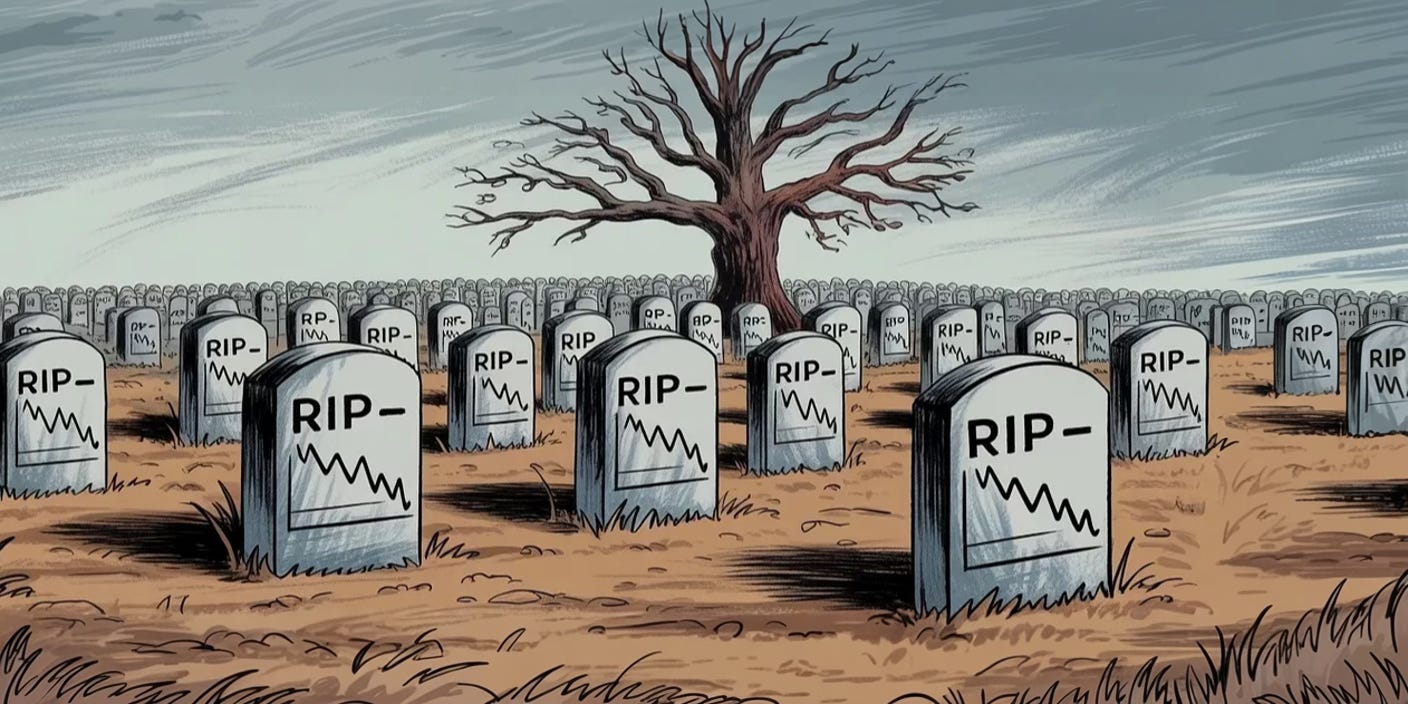The Stock Market's Graveyard: How Retail Investors Became the Victims
Since 1990, hundreds of public stocks have gone bankrupt
Imagine putting your hard-earned money into a company’s stock, only to watch it crumble to nothing as the business files for bankruptcy. It’s a nightmare that’s happened to thousands of investors over the years. Since 1990, hundreds of public companies listed on major exchanges like the NYSE have gone bankrupt, wiping out billions in shareholder value. In fact, recent data shows a surge in corporate failures, with 446 large company bankruptcies in the first seven months of 2025 alone—the highest in 15 years. This isn’t just bad luck; it’s a reminder of how tough the stock market can be. For everyday retail investors trying to pick the next big winner is often a losing battle. That’s why many experts suggest leaving the heavy lifting to professionals at hedge funds. Let’s break this down in simple terms.
The Bankruptcy Boom: Companies Disappearing Left and Right
Bankruptcies aren’t rare events; they’re a regular part of the business world. From 2000 to 2023, the U.S. saw thousands of business bankruptcy filings each year, with numbers spiking during tough economic times like the 2008 financial crisis or the recent post-pandemic struggles. In 2024, over 517,000 bankruptcy cases were filed, including both businesses and individuals, up 14% from the year before. And 2025 is on track to be even worse, with 63 corporate bankruptcies in June alone setting a pace not seen since 2010.
Think about famous examples: Lehman Brothers in 2008, with $691 billion in assets, was the biggest bankruptcy ever. When a company goes bankrupt, stockholders are usually last in line to get paid—meaning their shares often drop to zero. Over the long term, studies show that over half of all stocks end up losing money, and about one-third lose more than 75% of their value. That’s a scary stat: even if the overall market goes up, many individual companies don’t survive or thrive.
For every Amazon or Apple that dominates, there are dozens of forgotten firms like Blockbuster or Enron that vanish.
Why Retail Investors Find It So Hard to Pick Winners
Now, picture yourself as a retail investor: someone trading stocks from home, maybe using apps like Robinhood. Sounds fun and empowering, right? But the reality is harsh. Picking winning stocks is like finding a needle in a haystack, and most people end up getting pricked.
First, the odds are stacked against you. About 69% of stocks fail to beat the overall market’s returns over time. That means even if you research a company, there’s a good chance it underperforms or goes bust. Long-term stock survival rates are low—many companies get delisted from exchanges due to poor performance, mergers, or bankruptcy.
Second, emotions get in the way. Retail investors often buy high when everyone’s excited and sell low when panic hits. They chase hot tips, trade too much, or hold onto losers hoping for a comeback. Plus, you might not have access to the same info as big players—insider insights, advanced data, or global trends.
Third, time and knowledge are limited. Most retail investors have day jobs; they can’t spend hours analyzing balance sheets or predicting economic shifts. Institutional investors (like hedge funds) have teams of experts doing just that.
Why Handing It Over to a Hedge Fund Could Be Smarter
So, if DIY stock picking is so risky, what’s the alternative? Hedge funds offer a professional approach. These are investment pools run by experts who use sophisticated strategies to pick stocks, hedge risks, and aim for better returns.
Hedge funds have big advantages over retail investors:
Expertise and Resources: Managers have years of experience, access to private data, and tools that everyday folks don’t. They can spot trends early and avoid pitfalls.
Diversification and Risk Management: Instead of betting on one or two stocks, hedge funds spread money across many assets. They use techniques like short-selling to protect against downturns, something retail investors rarely do well.
While not every hedge fund beats the market , studies show they often outperform basic retail funds in terms of returns, especially in volatile times. Retail investors, on the other hand, struggle because they’re amateurs playing against pros.
Wrapping Up: Play It Safe in a Risky World
The stock market has created wealth for many, but it’s littered with the graves of bankrupt companies. For retail investors, the dream of picking winners often turns into a costly lesson. With low survival rates for stocks and human biases at play, it’s tough to come out ahead.
Instead of going it alone, consider trusting the pros at a hedge fund. They have the tools, knowledge, and discipline to navigate this complex game. Remember, investing isn’t about getting rich quick; it’s about building wealth steadily.



